Lavrov's hardline remarks cast doubt on prospects for peace talks - snap analysis

Pjotr Sauer
Russia’s foreign minister warned that Moscow must have an effective veto over any measures to support Ukraine once a peace deal is reached, undermining western plans to provide Kyiv with security guarantees.
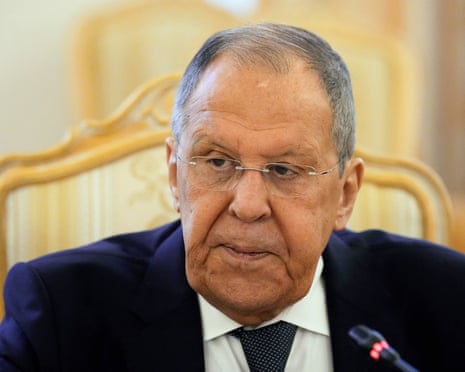
In a series of hardline remarks (12:30), Sergei Lavrov said European proposals to deploy troops in Ukraine after a settlement would amount to “foreign intervention,” which he called absolutely unacceptable for Russia.
He also poured cold water on the prospect of a Putin–Zelenskyy summit touted by Donald Trump, saying a bilateral meeting at the highest level would only be possible “if all issues requiring discussion are thoroughly prepared.”
Russia’s veteran foreign minister further questioned whether Volodymyr Zelenskyy had the legitimacy to sign any future peace accord, parroting a familiar Kremlin line that portrays Ukraine’s leadership as illegitimate.
Lavrov’s remarks cast doubt on the prospects for peace talks, suggesting that Russia is retreating from the understandings reached in Alaska – where Trump claimed Vladimir Putin had accepted western security guarantees for Ukraine – or that the US administration may have misinterpreted the Kremlin’s position from the outset.
Key events 44s ago Nato leaders must 'not be naive' about any potential Ukraine deployment, head of German soldiers' union says 49m ago How attacks on maternity hospitals fuelled a birth-rate crisis in Ukraine 2h ago Trump steps back from Russia and Ukraine peace talks for now, sources say 2h ago No deal with US on tariffs for beers, wine, spirits, Šefčovič says 2h ago EU pushing to get US 15% tariff for cars to apply retroactively, Šefčovič says 3h ago EU's Šefčovič defends deal with US as 'not end, beginning' of supporting EU-US trade 3h ago Lavrov's hardline remarks cast doubt on prospects for peace talks - snap analysis 3h ago EU-US agree on much-awaited 'joint statement' advancing political deal on transatlantic trade 3h ago German foreign minister rows back on comments about sending troops to Ukraine 3h ago Ukrainian man arrested over Nord Stream pipeline attack, German prosecutors say 3h ago Lavrov blames Ukraine, Coalition of the Willing for no progress in peace talks 4h ago Ukraine wants to get more details on security guarantees in '7-10 days' 4h ago Zelenskyy says he asked Trump to get Hungary to drop its opposition to Ukraine's EU accession 5h ago Drone that fell in Poland 'probably' came from Belarus, prosecutor says 5h ago European leaders scrambled to shield Ukraine in high-stakes Trump talks – but did they? 6h ago 'Let's first hear what Russia is willing to do,' Zelenskyy says on territorial concessions 6h ago Morning opening: More questions than answers Show key events only Please turn on JavaScript to use this feature
Nato leaders must 'not be naive' about any potential Ukraine deployment, head of German soldiers' union says
European Nato leaders must not be naive when discussing a Ukraine peace force but face up to the reality that they would need to deploy tens of thousands of troops to the country for the long term, the head of Germany’s soldiers’ union said.
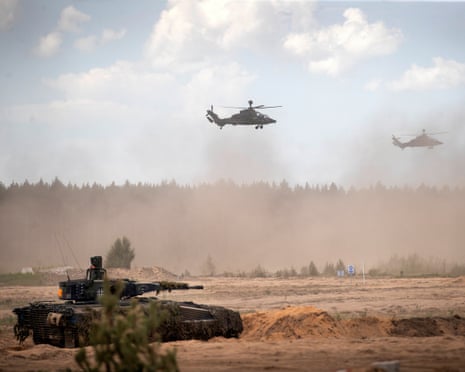
In comments reported by Reuters, Col Andre Wuestner, head of the German Armed Forces Association, called on European leaders not to play down the military task.
“It won’t be enough to have a handful of generals and smaller military units man a command post in Ukraine,” Wuestner, whose organisation represents more than 200,000 active and retired soldiers, told Reuters.
“From the very beginning, it must be made clear to Putin – and backed by international forces – that we are totally serious about security guarantees”, he said.
Wuestner estimated that each of the big countries in the coalition of the willing, such as Britain, France and Germany, would need to deploy at least 10,000 troops to Ukraine for the long run, posing a huge challenge to their already stretched and under-equipped forces.
How attacks on maternity hospitals fuelled a birth-rate crisis in Ukraine
Liz Cookman
in Kharkiv, Kherson and Sloviansk
It was one of the most horrifying targets of Russia’s war on Ukraine so far.
Reports showed a pregnant woman on a stretcher, her face ashen with shock, legs smeared with blood and a hand holding her bump. Behind her, the bombed-out ruins of Mariupol’s maternity hospital. More than a dozen people, including women in labour, were injured in the attack in March 2022. The woman photographed, Iryna Kalinina, later died along with her unborn baby.
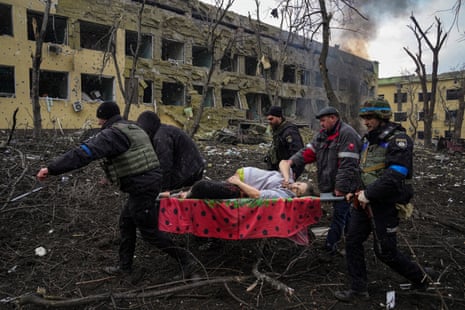
In the three years since then, maternity care in Ukraine has remained under constant attack, with more than 2,000 strikes on medical facilities, including 81 affecting maternal care and delivery rooms. Just last month, Diana Koshyk, seven months pregnant, was killed when a missile struck a maternity hospital in the eastern Dnipropetrovsk region.
Russian attacks on Ukrainian maternity unitsOver the past month, the Guardian has visited three maternity hospitals on the frontline to witness how Russia’s full-scale invasion and attacks on healthcare facilities have taken away women’s fundamental right to a safe childbirth.
Trump steps back from Russia and Ukraine peace talks for now, sources say

Hugo Lowell
in Washington
Donald Trump intends to leave Russia and Ukraine to organise a meeting between their leaders without directly playing a role for now, according to administration officials familiar with the situation, taking a step back from the negotiations to end Russia’s invasion of Ukraine.
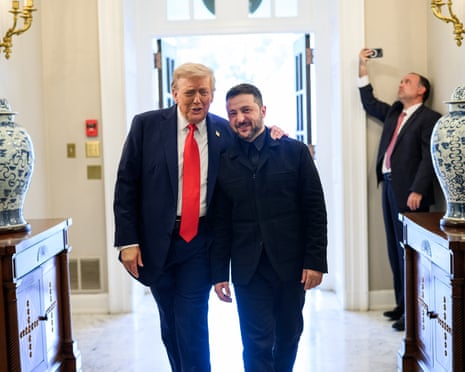
The next stage in Trump’s eyes to end the war in Ukraine remains a bilateral meeting between Vladimir Putin, the Russian president, and Volodymyr Zelenskyy, the Ukrainian president, the officials said.
Trump has told advisers in recent days that he intends to host a trilateral meeting with the two leaders only after they have met first, although whether that initial conference takes place remains unclear and Trump does not intend to become involved in that effort.
In a phone interview with talkshow host Mark Levin on WABC on Tuesday, Trump also said he thought it would be better for Putin and Zelenskyy to meet without him in the first instance.
“I just want to see what happens at the meeting. So they’re in the process of setting it up and we’re going to see what happens.”
Trump’s reluctance to push Putin and Zelenskyy to a meeting comes as he has acknowledged in recent days that ending the war in Ukraine has been more difficult than he had anticipated, after saying on the campaign trail last year he could achieve it in 24 hours.
No deal with US on tariffs for beers, wine, spirits, Šefčovič says
Šefčovič is still speaking, confirming among others that the digital sector was kept out of the current trade talks with the US, among others.
But in a blow to EU winemakers and spirit producers, he says the bloc could not secure a deal in this area, despite lobbying from Europe’s greatest winemakers in France, Italy, Germany, Spain and Portugal.
He says:
“The tariffs on the wine, spirits and beer was one of very important offensive interests of the European Union.
Unfortunately here, we didn’t succeed to get this sector and this category among the sectors which would continue to be on the MFN [Most Favoured Nation] level.
I just would like to add one very important word, and this is: yet.
Because our US colleagues, they know that this is our offensive interests, that’s something which is very important for us.
And therefore I would also refer you to the paragraph which is very important for us, which says that both parties, the United States and the EU, are ready to look at other sectors where we could lower these tariffs in the future.”
EU pushing to get US 15% tariff for cars to apply retroactively, Šefčovič says
Importantly for EU’s carmakers, Šefčovič says that the bloc was pushing to get new 15% tariff applied retroactively back to 1 August.
“I believe this is welcome news for our car industry, which was bleeding a lot of cash over the last few months,” he says, saying it weighed on the negotiators’ minds.
He said the EU was looking to present necessary legislative proposal this month.
EU's Šefčovič defends deal with US as 'not end, beginning' of supporting EU-US trade
Back to Brussels, EU trade commissioner Maroš Šefčovič is speaking now on the EU-US trade arrangements.
He reiterates the point made by von der Leyen in the press statement that the joint statement “this is not the end, it’s the beginning.”
“This framework is the first step, one that can grow over time to cover more sectors, improve market access and strengthen our economic ties even further, this work has been intense and essential,” he says.
He stresses the importance of the arrangement, saying:
“This carries considerable weight and is truly impactful at the time when the trade landscape has completely changed.
Our transatlantic relationship is one of the largest economic partnerships in the world, and this agreement has a clear common goal, to put it on solid ground and help drive free industrialization on both sides of the Atlantic, and we want to fully unleash the potential of our combined economic power.”
Similarly to his comments in the past, he also says that the alternative to this, however imperfect, deal was much worse.
“The alternative, a trade war with sky high tariffs and political escalation, helps no one.
It hurts jobs. It hurts growth, and it damages businesses across both the EU and the US. And this is not theoretical as nearly 5 million European jobs, including many in SMEs would be at risk.
This deal avoids that path.”
Lavrov's hardline remarks cast doubt on prospects for peace talks - snap analysis

Pjotr Sauer
Russia’s foreign minister warned that Moscow must have an effective veto over any measures to support Ukraine once a peace deal is reached, undermining western plans to provide Kyiv with security guarantees.

In a series of hardline remarks (12:30), Sergei Lavrov said European proposals to deploy troops in Ukraine after a settlement would amount to “foreign intervention,” which he called absolutely unacceptable for Russia.
He also poured cold water on the prospect of a Putin–Zelenskyy summit touted by Donald Trump, saying a bilateral meeting at the highest level would only be possible “if all issues requiring discussion are thoroughly prepared.”
Russia’s veteran foreign minister further questioned whether Volodymyr Zelenskyy had the legitimacy to sign any future peace accord, parroting a familiar Kremlin line that portrays Ukraine’s leadership as illegitimate.
Lavrov’s remarks cast doubt on the prospects for peace talks, suggesting that Russia is retreating from the understandings reached in Alaska – where Trump claimed Vladimir Putin had accepted western security guarantees for Ukraine – or that the US administration may have misinterpreted the Kremlin’s position from the outset.

Jakub Krupa
It’s worth remembering that the joint statement is still technically not legally binding on the parties, but is a “blueprint” or a “road map” that further spells out and advances their political commitments on the EU-US trade, progressing the talks in Turnberry.
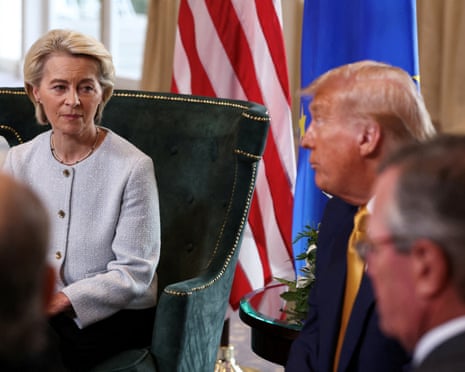

Jakub Krupa
We should hear more about the deal from the EU’s trade commissioner Maroš Šefčovič, who is expected to be up at the European Commission shortly.
I will bring you the key lines here.
EU-US agree on much-awaited 'joint statement' advancing political deal on transatlantic trade
We have just heard from the European Commission, confirming that the EU and the US have now agreed on the much-awaited “joint statement” advancing the political commitments on trade agreed by Ursula von der Leyen and Donald Trump in Scotland last month.
The commission’s press release says the statement “lays out in detail the new US tariff regime towards the EU, with a clear maximum, all-inclusive, tariff rate of 15% for the vast majority of EU exports, including strategic sectors such as cars, pharmaceuticals, semiconductors and lumber.”
“Sectors which are already subject to Most Favoured Nation (MFN) tariffs of 15% or above, will not be subject to additional tariffs,” it added.
It also said that “with regard to cars and car parts, the 15% US tariff ceiling will apply in tandem with the EU initiating the procedures for tariff reductions vis-a-vis US products.”
Separately, a senior US official told Reuters that tariff relief for EU carmakers were expected to come in “hopefully weeks.”
The text of the joint statement also confirms the EU’s commitment to “procure US liquified natural gas, oil and nuclear energy products” valued at $750bn through 2028, with another $40bn expected to be spent on US AI chips for computing centres.
Von der Leyen welcomed the publication, saying that “faced with a challenging situation, we have delivered for our Member States and industry, and restored clarity and coherence to transatlantic trade.”
She also hinted that the EU would continue working “to agree more tariff reductions, to identify more areas of cooperation, and to create more economic growth potential.”
German foreign minister rows back on comments about sending troops to Ukraine

Kate Connolly
in Berlin
Johann Wadephul, the German foreign minister, has had to row back on comments he made earlier this week, in which he suggested that Germany’s military would be too overstretched if it had to send troops to Ukraine.
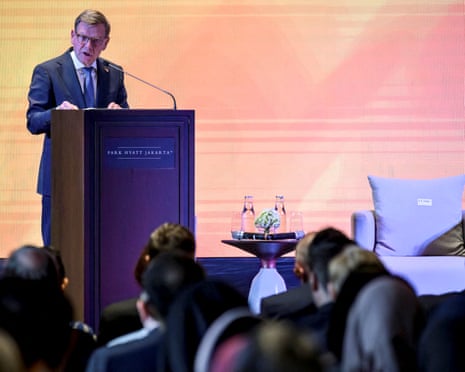
Wadepfuhl said in an interview that the Bundeswehr was already contributing troops to a combat-ready brigade in Lithuania. “Doing that and also stationing troops in Ukraine would probably overstretch us,” he said.
The discussion over troops in Ukraine concerns finding a security guarantee for Ukraine if and when Moscow ceased its war on the country. One suggestion has been for Nato members to station troops in the country, even as Moscow has said it’ll not accept such an arrangement.
Wadephul made the remarks ahead of the key meeting in Washington between Ukrainian president Volodymr Zelenskyy, US president Donald Trump, and a number of their European counterparts.
Wadepfuhl, who is on a trade trip to Asia, has since said that ultimately it would be for the defence minister Boris Pistorius to make a decision, and has denied that he “directly or indirectly” doubted the capacity of Germany’s military.
The remarks come at a time when Germany is in the midst of a lively debate about how it might boost military recruits, and whether it should reintroduce conscription.
Ukrainian man arrested over Nord Stream pipeline attack, German prosecutors say
In other news, Italian police have arrested a Ukrainian man suspected of coordinating the attacks on the Nord Stream pipelines, Germany’s prosecutor general said, adding that he would be brought before a German judge after being transferred, Reuters reported.
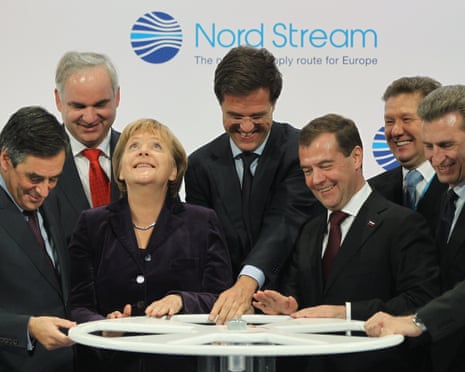
The suspect, identified only as Serhii K. under German privacy laws, was part of a group of people who planted devices on the pipelines near the Danish island of Bornholm in September 2022, a statement from the prosecutor’s office said.
The prosecutor’s office allege that the man and his accomplices had set off from Rostock on Germany’s north-eastern coast in a sailing yacht to carry out the attack, adding that the vessel had been rented from a German company with the help of forged identity documents via middlemen.
Carabinieri officers arrested the suspect overnight in the province of Rimini on Italy’s Adriatic coast, the German prosecutors’ statement said.
Reuters noted that no one has ever taken responsibility for explosions that severely damaged pipelines carrying gas from Russia to Europe in September 2022, marking a major escalation in the Ukraine conflict and ramping up an energy supply crisis on the continent.
Lavrov blames Ukraine, Coalition of the Willing for no progress in peace talks
Meanwhile, Russian foreign minister Sergei Lavrov has been speaking in the last few minutes, shifting blame for little progress onto Ukraine.
In comments, reported by Reuters, he claimed without offering evidence that Ukraine wanted to “undermine Trump’s efforts to resolve conflict,” and insisted that Russia “was already ready for an honest talk about security guarantees,” but along the lines of its maximalist 2022 proposal.
Lavrov even appeared to question Zelenskyy’s legitimacy to sign any deal, saying that “when it comes to signing something, the issues of legitimate of the Ukrainian representative will have to be resolved.”
He also criticised the “Coalition of the Willing,” saying they wanted to “shift the focus away from resolving the root causes of the conflict,” and saying that he hoped “such European adventurism fails.”
Lavrov also rejected any suggestion that European troops could be present in Ukraine as part of security guarantees, saying it would be “completely unacceptable” for Russia.
Ukraine wants to get more details on security guarantees in '7-10 days'
Zelenskyy also told reporters that he would want to see an agreement on security guarantees for Ukraine before meeting Russia’s Vladimir Putin, AFP said.
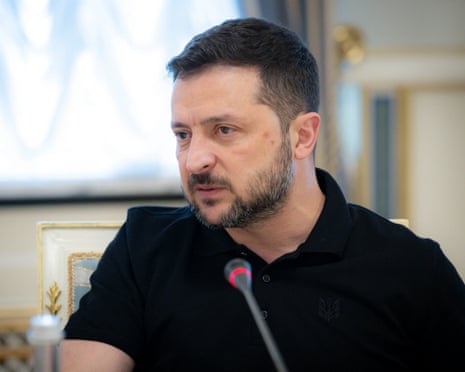
He warned that in the meantime both sides were preparing for further fighting, with Russia building up troops on the southern frontline and Ukraine test launching a new long-range cruise missile.
“We want to have an understanding of the security guarantees architecture within seven to 10 days,” Zelensky said, in comments to reporters released for publication Thursday.
“We need to understand which country will be ready to do what at each specific moment,” he said. A group of allies led by Britain and France are putting together a military coalition to support the guarantees.
Zelenskyy also indicated his preference on where the meeting could take place, calling for a “neutral” European country.
“Switzerland, Austria – we agree... For us, Turkey is a Nato country and part of Europe. And we are not opposed,” Zelensky said of possible venues.
Zelenskyy says he asked Trump to get Hungary to drop its opposition to Ukraine's EU accession
We are also getting more details from Zelenskyy’s comments to a group of reporters, via agencies.
The Ukrainian president revealed that during his meeting with Donald Trump on Monday, he asked the US leader to pressure Hungary into dropping its veto on Kyiv’s bid to join the EU, AFP reported.
“It is absolutely fair that Ukraine wants to join the European Union... This is our sovereign right,” Zelensky told reporters.
“President Trump promised that his team would work on this,” he said.
Bloomberg reported yesterday (£) that Trump indeed called Hungary’s Viktor Orbán later to discuss the issue.
Drone that fell in Poland 'probably' came from Belarus, prosecutor says
If you followed the blog on Wednesday, you know we looked at an incident with an allegedly Russian drone that crossed into Poland and exploded in a cornfield, some 100 km from Polish-Belarusian border.
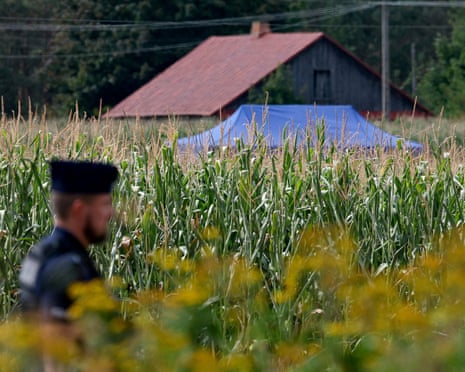
A regional prosecutor issued an update today, saying that “there is a very high probability … that the object probably came from Belarus.”
That marks a slight shift of tone, as on Wednesday officials claimed the drone was launched from Russia.
But deputy foreign minister Marcin Bosacki said this morning that a protest note would be given to Russia later today, Reuters reported.
European leaders scrambled to shield Ukraine in high-stakes Trump talks – but did they?

Ashifa Kassam
European community affairs correspondent
Days after the unprecedented flurry of diplomacy, questions continue to swirl over what – if anything – might come out of it. On Monday, Trump and several European leaders, said Putin had agreed to face-to-face talks with Zelenskyy in the coming weeks.
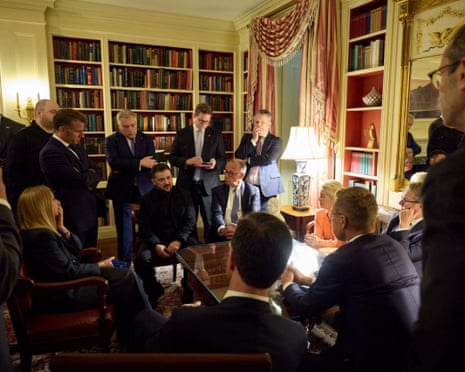
Moscow, however, has yet to confirm that any such meeting – which would be the first since Russia launched its full invasion of Ukraine more than three years ago – is being planned, with a Kremlin aide saying only that Putin and Trump discussed the idea of “raising the level of representatives” in the Ukraine talks.
Trump had also indicated a willingness to be part of security guarantees for Kyiv if there was a deal to end fighting. But the exact nature of those guarantees remains to be seen, with Trump later ruling out the possibility of the US putting troops on the ground in Ukraine and instead floating that Washington could provide air support.
Concerns also continue to linger over what exactly Trump proposed in Alaska and what, if anything, Putin agreed to during the near three-hour meeting. As Pjotr Sauer, a Guardian Russian affairs reporter, noted, some fear Trump may have overstated the outcome and misjudged Moscow’s willingness to compromise.
'Let's first hear what Russia is willing to do,' Zelenskyy says on territorial concessions
In further comments from Zelenskyy this morning, reported by Reuters, he said it was unclear what concessions regarding territory Moscow was willing to make to end the war.
Trump has previously said Kyiv and Moscow will both need to cede land.
“To discuss what Ukraine is willing to do, let’s first hear what Russia is willing to do,” Zelenskiy said. “We do not know that.“
Morning opening: More questions than answers

Jakub Krupa
Three days on from the White House summit on Ukraine, the signals are no longer as positive as US president Donald Trump would have wanted us to believe.
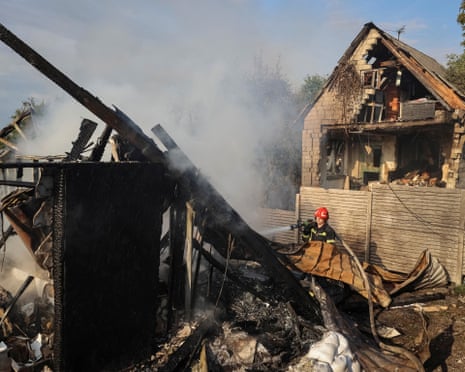
Overnight, Politico reported that the US undersecretary of defence for policy, Elbridge Colby, told European allies that the US would only offer minimal guarantees for Ukraine, with most burden left for Europe to pick up.
A Nato diplomat briefered on the talks told Politico: “The US is not fully committed to anything.”
Any prospects of making further diplomatic progress also appeared to have stalled, with numerous Russian officials and diplomats toning down the expectations for both ceasefire and a potential Zelenskyy-Putin meeting.
Russia’s foreign minister Sergei Lavrov said that any meeting would need to be prepared “with the utmost care”, while the country’s deputy representative to the UN, Dmitry Polansky, told the BBC that “it shouldn’t be a meeting for the sake of a meeting.”
Or to translate to plain English: thanks but no, thanks.
Ukraine’s Volodymyr Zelenskyy responded to these stalling tactics this morning, calling for a “strong reaction” from the US if Putin refuses to meet him, as discussed with Trump.
The Ukrainian president also appeared to play down the prospect of the Hungarian capital, Budapest, hosting the potential summit with Putin, calling it “challenging.”
Hungary has long been Russia’s loudest advocate within the European Union, often looking to delay or block the sanctions, and criticising Kyiv and other capitals for their approach to the war. Budapest is also blocking Ukraine’s accession process to the EU.
Zelenskyy also pointed out another round of Russian attacks overnight, including against an American enterprise in Zakarpatia region, which injured 15 people.
He said the attacks were “as if nothing had changed at all.”
“A response is needed to this. There is still no signal from Moscow that they are really going to go into meaningful negotiations and end this war. Pressure is needed. Strong sanctions, strong tariffs.”
I will bring you all the key updates here.
It’s Thursday, 21 August 2025, it’s Jakub Krupa here, and this is Europe Live.
Good morning.

 1 month ago
1 month ago


















